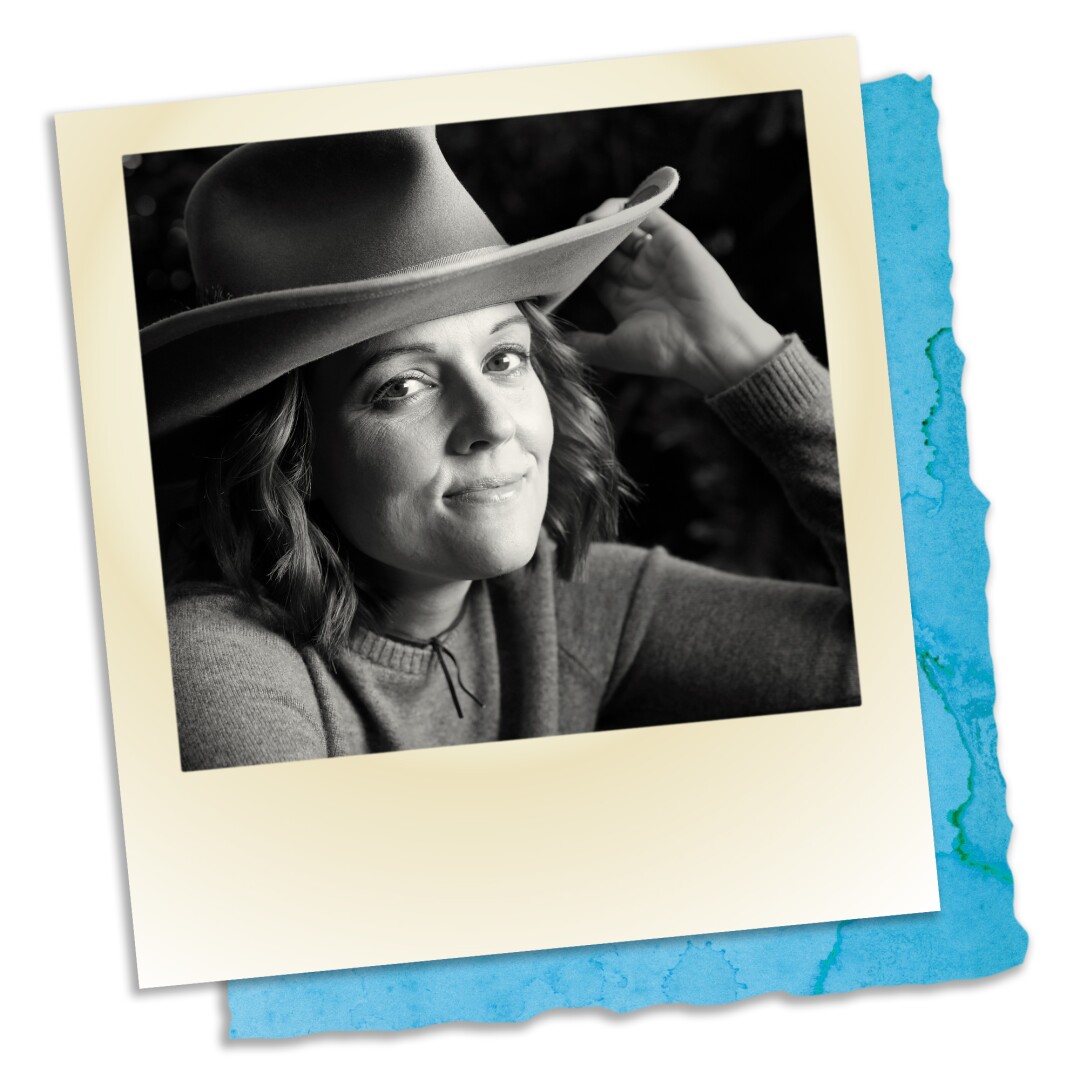To commemorate the 50th anniversary of Joni Mitchell’s “Blue,” we asked 10 top artists — some legendary friends and peers of Mitchell’s, some her musical progeny — to each choose a song from the landmark album and explain what it meant to them, why it pierced their hearts and minds. We’ve arranged their billets-doux in the running order of the album if you want to drop the needle and listen along.

(Photograph by Myung J. Chun / Los Angeles Times; photo illustration by An Amlotte / Los Angeles Times)
Joni and I had our year together, back when a year lasted three times longer than it does today. Inflation. That was 50 years ago. My time with her included the recording of her “Blue” album and I remember the sessions at A&M Studios with Henry Lewy behind the glass. There was never anyone else there, just Joni, Henry and me. I played on “All I Want,” “Carey,” “California” and “A Case of You.” She had written most of those songs in the previous year or so while traveling. Maybe that’s why so many were composed on the three-string dulcimer: a nice, portable axe. Playing along with her spare dulcimer accompaniment, I was free to substitute whatever chords I felt, which was great; but of course, it was her voice and the songs themselves that make “Blue” so singular. To his credit, Henry Lewy had us keep it simple. I believe that some of those songs were written with me in mind although, as a songwriter, I know how songs can have their own bent truth. Still, I hear a personal message in several of them, her gift to me: the lucky one.
“All I Want” allows itself to be light and loving, as sunny a sentiment as we are apt to hear from her. It’s a kiss, a love note, a valentine. Listen to her laugh at the end of “Big Yellow Taxi.” Like that…
Adrianne Lenker (Big Thief), “My Old Man”
On “My Old Man,” Joni describes the kind of love where you cast aside the need for marriage, understanding that a certificate is just a piece of paper — a system in a structure that’s totally aside from the feeling of real love. You have something so strong that it exists on its own; there’s a natural desire for being true and together, and maybe marriage has nothing to do with that.
Joni describes this person as being the warmest chord she’s ever heard in this very romantic way. “He’s a singer in the park / He’s a walker in the rain / He’s a dancer in the dark.” What a beautiful connection to experience with someone, that there’s this person who keeps her blues away, who, when he’s gone, everything feels empty. The bed’s too big. The frying pan’s too wide. And I feel that, especially because I’ve gone through different relationships and I felt very big heartbreak in this last year.
At this point in my life, as a 29-year-old woman — maybe not so far from when Joni was making this record in her own life — what I’m really trying to do is embrace myself and feel like I am the warmest chord. That I can feel warmed by my own company, and can also see that I’m all of these things that I usually externalize and put on another person.

(Photograph by Phillip Faraone / Getty Images for iHeartMedia; photo illustration by An Amlotte / Los Angeles Times)
“Little Green” perfectly sums up “Blue”’s appeal in that it’s immediately appealing, it’s got a beautiful, plaintive melody, it’s musically straightforward, she’s still working very much in that folk-y singer-songwriter style — but then you peel back the surface and it has this extraordinary emotional depth.
It’s a song about the daughter Joni gave up for adoption in the mid-‘60s, an incredibly brave subject for anyone to write about, but particularly a woman 50 years ago. The lyrics are astonishing, the mix of beautiful imagery — the icicles and the Northern Lights and the spring crocuses — and brutal honesty about an incredibly sensitive topic. There’s no anger in them, she isn’t castigating herself, she literally sings “[I’m] not ashamed” — this thing had to happen, it was painful but it was the right thing to do, she was a “child with a child.” It’s sad, but realistic, which makes it all the more poignant.
It’s strange, I always thought of Joni as an incredibly inspirational figure — I listened to albums like “Blue” and “The Hissing of Summer Lawns” in complete awe. She was a fabulous songwriter and she never repeated herself, never thought “I’m on a roll, I’ll make an album like that again,” she always followed her own path — but I never thought of my music as directly influenced by hers. Then, a few nights ago, I heard Brandi Carlile play “Madman Across the Water” on an acoustic guitar. It was obviously written on piano and I’d never really heard it played on guitar before. And it sounded very Joni-esque. Psychologically, her style had implanted itself really deep in my subconscious, and it came out in songs like that.
She made so many great albums, but “Blue” is her masterpiece and “Little Green” is the most poignant, emotionally heavy thing on it. I know Joni and I love her, but the subject of that song is not something I would ever bring up with her. But then, I don’t need to: Everything you need to know is in the lyrics.
Lucy Dacus, “Carey”
I’m a sucker for songs that sound like they’re for a lover but are actually for a friend. Joni is a Scorpio, so it comes as no surprise to hear her daydreaming about her own bed, her fancy French cologne and flirting her way into a friendship with someone who was originally unimpressed by her. The song was a birthday gift for Carey, who is a real guy, someone she met on a trip to Greece while getting over a breakup. So many of us have been there, following the impulse to escape in order to recognize what home means, and eventually making the choice to go back. I love the idea that a rebound doesn’t have to be a new relationship, it can be convincing a mean old daddy to like you. What better proof that you’re likable? There’s room for romance just about everywhere. Joni knows that.
Haim, “Blue”
The first Joni Mitchell record we ever bought was “Miles of Aisles,” but our first real introduction to Joni was the “Blue” album because our mom would talk about how that made her want to be a songwriter. As we grew older and started diving deeper into the record, it was hard not to recognize why this album made our mom feel that way, specifically the song “Blue.” From the opening piano melody and the first utterance of the world “blue,” you’re instantly transported to the place and time of how she was feeling when she wrote the song. The rawness of her vocals and the confessional style of her lyrics have always resonated with us, but “Blue” in particular struck a deeper chord. It’s a song we always revisited when writing our album “Women In Music Pt. III.” At the time, we were collectively heading down our own individual spirals of depression and hearing this song was our security blanket.
Rufus Wainwright, “California”
I was late to the game with Joni Mitchell. My mother [Canadian folk singer Kate McGarrigle] — how should we say it? —was a competitor. She was quite jealous of Joni’s success, so I wasn’t really allowed to listen to her. Now I’m an avid fan.
I think “California” could only be written by someone who’s not from California, but from a cold climate like Canada. You just have this aching sense of gratitude for all that California has to offer, from someone who has grown up in a dark atmosphere up north. The image that emblazoned itself upon my mind is of a beautiful, 27-year-old Joni kissing a pig. That’s a brilliant symbol of California, the good, the bad and the ugly.
I really studied “California” and was going to sing it, but I actually realized that I don’t feel I have the strength to pull it off. It’s very hard to sing. There’s an acrobatic quality to it that I was afraid to tackle. I surrounded it once, but I retreated.
Katie Crutchfield (Waxahatchee), “This Flight Tonight”

(Photograph by Tim Mosenfelder / Getty Images; photo illustration by An Amlotte / Los Angeles Times)
When I first started developing more refined taste in music, I really rejected a lot of music from this era. I didn’t listen to anything from the ‘60s or ‘70s aside from punk rock. But Joni always broke through for me. I always felt a real kinship for “Blue” and I don’t really know why. The avant-garde-ness of it appealed to me even when I was very angsty.
“This Flight Tonight” is evocative of such a familiar feeling. The whole record feels like it’s about this breakup and being off on your own and exploring. I feel like I have had that experience several times over. The flight home, when you’re confronted with the stuff that maybe you were running away from in the first place. Long flights home are sometimes really emotionally charged events, so having that put into song feels so relatable.
And musically, the way that she strums the chords against the vocal melody — that to me is one of her signature things. If I were to just sit with that chord progression and not sing over it — that’s the last melody on Earth I would have picked or thought to put there, and yet it works so well.
David Crosby, “River”
“Blue” is the best singer-songwriter record ever made. I think it’s better than the Beatles. It’s better than anything Bob Dylan did, better than anything from either of the Pauls, McCartney and Simon. It’s better than anybody, anywhere. This record, this batch of songs, is the pinnacle of singer-songwriter ability. Hands down. No contest.
How she sounds, when she’s singing “River,” like, she hurts. Well, she was hurting. It’s emotionally genuine. She’s telling the truth. She had relationships with me, Graham Nash, James Taylor, Jackson Browne, a bunch of us. And they all were fiery and beautiful and painful, and they all failed. And she did hurt us. “I made my baby cry.” Well, she did. I know I was one of them. I cried. I cried a lot. I know Nash did. I know that Jackson did. I suspect that James did too. We, for a moment, stood in the brief glare of her almost actinic light, this crazy brightness coming off of her. And it burned us, but it was beautiful. She would always say that it was the guy’s fault. I don’t think Joni ever had malicious intent, even though she did do some malicious things. Sometimes she would lash out at people. She punched Jackson.
Good poetry, man. But she converts pain and loneliness and sadness and failure and struggle into emotionally moving sound. Every time I listen to it, I am moved to tears. It’s just that strong. I love her, man. I can’t help that. I don’t get along with her, but I love her dearly.

(Photograph by Carolyn Cole / Los Angeles Times; photo illustration by An Amlotte / Los Angeles Times)
“A Case of You” has been interpreted, loved and worn like a coat by many a lonely painter; it has meant a different thing to each of us. This song is specific — there’s nothing ambiguous about the sentiment. It’s not overly laden in metaphor and yet I’m not the only American folk singer to squeeze my eyes shut and choke back tears while singing the words “Oh Canada” and meaning it with all my heart. What is it about “A Case of You”? Why have we tattooed it on our souls in such a powerful and universal way when it’s such a personal declaration?
As an artist, I know when I’m telling the truth, even if it’s someone else’s, even if it’s Joni’s. Living inside this song doesn’t feel like hearing a story, it feels like telling one. I’ve forgotten about Joni and I’ve abandoned speculating who the song may be about after the second line. Joni’s famous wish, that we find our own lives in her art instead of hers, is involuntarily granted.
The remarkable thing about this poem is that Joni has convinced us all to live inside of it while never sparing us a single detail. “I could drink a case of you and I would still be on my feet” is the most beautiful and unique declaration of love I can think of. It can mean many things to many people. I think of my wife and daughters when I hear or sing it. My love for them is insatiable and yet I can keep my feet underneath me because, for me, true love has been stabilizing. I’ve been known to find myself on the floor a few times too, though.
This song has met many of us in our darkest moments and walked us down the aisle, even sent us to the other side of existence. We’re so lucky to have it with us.
It’s got a long intro — she’s giving you time to sit with the piano at the end of the album, almost like the guy at the piano bar doing a bit of a reprise of the evening’s entertainment before he sends you into the night.
The song is about a man and a woman, but there’s no romantic thing between them; they’re not dating. They’re reporting to each other on their lives — “I haven’t seen you in a while, how you doing?” But neither of them is actually doing the way they’re reporting.
Joni’s writing words that could describe anybody’s experience. I think she’s been such a powerful storyteller for so long because of how universal, almost Shakespearean, her scenarios are. That sad sack at the bar, what’s the story behind him? Oh wait, it’s you — you’re the sad sack at the bar.
The woman in it and the man in it could swap places easily, and in fact, they do by the end. That’s the irony of the song — how any romantic arrives at the same fate, which is that romance ebbs and flows. You’re gonna be coming up or going down, even when you’re married and you’re sure it’s forever. It isn’t; they’re all pretty lies. And yet there’s no sweeter ride to take.
window.fbAsyncInit = function() { FB.init({
appId : '134435029966155',
xfbml : true, version : 'v2.9' }); };
(function(d, s, id){ var js, fjs = d.getElementsByTagName(s)[0]; if (d.getElementById(id)) {return;} js = d.createElement(s); js.id = id; js.src = "https://connect.facebook.net/en_US/sdk.js"; fjs.parentNode.insertBefore(js, fjs); }(document, 'script', 'facebook-jssdk'));
For all the latest Entertainment News Click Here
For the latest news and updates, follow us on Google News.
